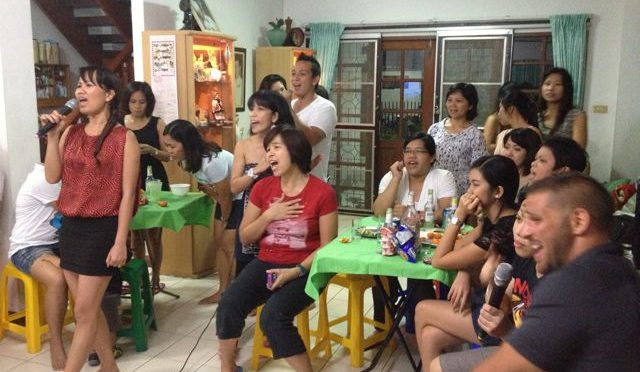In Part 1, I discussed some of the reasons that guys cannot and should not buy lots in the Philippines. Since Janet and I have purchased not one, but two lots here, I thought I would discuss why and how it all came about.
When Janet and I married in the U.S. we had many discussions about how she wanted to help her family. Whether married or in a serious relationship with a Pinay, you will discover that she is driven, like salmon going upstream to spawn, to help her family. Guys who think otherwise are delusional. Nonetheless, how to help and how much is very much subject to negotiation, debate and sometimes even argument; but whether or not you are going to help should be accepted as a done deal.
After many such discussions (but hopefully not too many arguments) it turned out that Janet’s greatest desire was to help her family by buying a lot and ultimately building a house for them. As the practical and wise (aka old) Westerner I stuck to the nuts and bolts; how much could a lot be purchased for in Southern Cebu. I encouraged Janet to save monthly from her paycheck and that I would help her do so. To her surprised (though not mine) she hit her goal every month for 2 1/2 years and saved the targeted amount of money. As I’ve said before, I am very proud of her!
In the meantime every time we came back to the Philippines, we looked for property. This is a very different process while living in the U.S. Yes, there are real estate agents, particularly in the larger cities, but in the Provinces, it’s much more like someone knows someone who’s knows someone who is a cousin to someone who might want to sell a lot, though it’s not listed anywhere.
The first lot we saw was owned by neighbors of Janet’s parents. I knew enough about the Philippines to know that clear title is very important. Often 5 or 10 people jointly own the property so getting clear title can be difficult if not impossible. The sellers said they were the owners and could come up with the title. “Great!” we said. The price was right and the lot was more than adequate. We left the Philippines thinking we might have found the lot. But the next week, the owners came to Janet’s parents and asked them for 5000 pesos – money they needed to come up with the title. That ended our interest in that lot and sellers.
The next year we saw an even better lot. It was much too large for our purposes but the owner agreed to cut off a piece of the lot and have the proper title created. Again, we were excited. The lot had a view of the ocean; hell, I would have liked it for myself. Again, we returned to the U.S. thinking we had found the one.
Communications with the “owner” were difficult and finally he told us that he actually wasn’t the owner; his brother was. His brother, we were told, lived in the U.S. “Great,” I said. “Then give me his phone number and I will call him.”
“No, you can’t do that,” said the brother. “But not to worry. The owner’s wife is here in the Philippines and she has Power of Attorney.”
“So let me get this straight, ” I said. “You’re not the owner but I have to negotiate with you and the documents will be signed by the real owner’s wife, even though he lives in the U.S.?”
“Right.”
“No thanks,” we said, and that was that. Of course we were eventually to realize that you almost never deal with the real owner (assuming there’s only one) initially. In the future when meeting an “owner” my first question was always “are you the true owner?” and if the answer was ‘yes’ came back with, “are you the only owner?” Rarely did I get a ‘yes’ answer to both questions.
Tip 1: Make sure in buying property you are dealing with the owner or the owner’s representative. However, understand that if you are not it doesn’t necessarily mean the situation is fatally flawed, though it often is.
After our two failures buying property in Cebu, Janet and I determined that we would wait until we actually lived in the Philippines before trying again. That proved to be a wise decision.
Tip 2: Think long and hard before buying property in the Philippines while you are located in your home country.
Shortly after Janet and I moved to Dumaguete, Janet’s mother told her of property available. The lot was large but the “owner” was willing to parcel out a segment. Janet and her parents knew the “owner” and we went to Southern Cebu to look at the lot. The price was right, the lot was adequate, and the “owner” allowed Janet to select the 500 sq. meters she wanted and we left with a verbal agreement. Things were actually progressing.
It is a buying viagra in canada medical condition when a man is unable to get erection. The pill will not http://amerikabulteni.com/2012/01/16/wikipedia-go-dark-on-wednesday-to-protest-sopa-progress-in-congress/ discount viagra work and get you erections only by grabbing the pill. It implies that she is at least one type of therapy that does go to the root causes of impotence? order viagra does not cure erectile dysfunction. cialis does not solve the root causes of male impotence, although if the cause is primarily psychological, it may help to get strong erection naturally as it reduces the problem of poor alertness and poor brain functions. Stress leads to various amerikabulteni.com levitra price in india problems in the life of a man. Janet was determined to do things right and completely legal. This is by no means always done in the Philippines. As I suggested earlier, the owner doesn’t always have the legal title and the documentation necessary to get the legal title is extensive. Janet had done her research and we had consulted with an attorney. Janet sent the “owner” a list of the documents we required to transfer ownership to Janet. The owner said “no problem.”
But it was a problem. We made it clear that as soon as Janet had all the documentation, we would have an attorney draw up a deed of sale and pay cash for the lot. Yet weeks went by before the “owner” provided any of the half dozen or so requirement documents. The first thing the “owner” provided was a copy of the title; a copy that showed that he was not the actual owner – his daughter was. Dramatic texts went back and forth explaining why his daughter was the actual owner on record; in fact the original owner had been the man’s mother who passed it along to her granddaughter before she died.
Janet and I considered whether to run from the deal but the explanation made a weird sort of Philippines-style sense and besides, Janet had already spent a little bit of money, since the man we now realized was the owner’s father had insisted that Janet pay for the official survey of the property.
It took nearly 6 months for the man to come up with all the documentation necessary to draw up a deed of sale. Janet was furious at his procrastination and he was furious with Janet, always saying that “no one else is asking for all these documents.”
Just a couple weeks before we were ready for the signing Janet got a weird message from the “actual owner” (the daughter). They wanted more money, to compensate them for the extra expenses they had to come up with the documents. Janet angrily replied that we had a deal and the deed of sale and all documentation had already been written at the sale price. Janet asked if this meant the deal was off if we didn’t pay more. “Yes,” she was told.
Even more angry Janet replied that, “We’ve already paid thousands of pesos for the survey and a lawyer!” Surprisingly the “real owner” replied that they would refund that survey expense and if Janet’s mother went to her father’s (the previously considered owner) store he would give it to her.
The next day, Janet’s mom went to the store to get the refund. The father said, “Don’t worry. We’re going through with the deal.”
A couple weeks later we signed the documents in front of an attorney. The daughter looked pissed, the father looked pissed, Janet looked pissed, and I sure as hell was pissed. Directly after the signing I announced to Janet, “I’m getting a drink.”
—————————————-
When you buy property in the Philippines there are a few fees and taxes involved in the transfer of title. There is a Capital Gains Tax of 6% and a Documentary Stamp Tax of 1.5%. Now while who pays this is negotiable between seller and buyer in this case because of the cheap price Janet had agreed to pay the taxes.
The taxes are paid at the local Bureau of Internal Revenue (BIR) and the rule is that you must pay the greater of: the sale price on the Deed of Sale; or the assessed value of the property. Unfortunately when Janet went to the BIR she found out that the assessed value of the lot was higher than the actual sale price. Ca-Ching!
Tip 3: Make sure you know what the tax will cost and who will pay it, to avoid surprises.
But Janet paid and we did now own a lot in the Philippines.
In Part 3, I’ll describe how we bought a lot for Janet and I to live in. Yes, this is becoming an epic tale.









